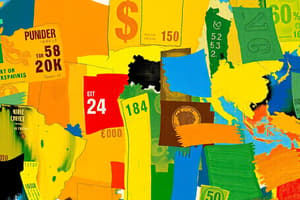Podcast
Questions and Answers
What is the primary purpose of the Automatic Exchange of Information (AEOI)?
What is the primary purpose of the Automatic Exchange of Information (AEOI)?
- To facilitate low-interest bank loans
- To improve international trade agreements
- To enhance global financial stability
- To lessen international tax evasion and fraud (correct)
Which of the following is a consequence of increasing capital mobility regarding tax compliance?
Which of the following is a consequence of increasing capital mobility regarding tax compliance?
- It guarantees better enforcement of tax laws
- It makes it easier for taxpayers to avoid paying taxes (correct)
- It increases foreign investment in local economies
- It leads to a reduced likelihood of tax evasion
In the context of AEOI, what is one significant cost associated with compliance for financial institutions?
In the context of AEOI, what is one significant cost associated with compliance for financial institutions?
- Implementation of new IT frameworks for data handling (correct)
- Decreased transparency in financial reporting
- Higher interest rates for loans to clients
- Increased competition in the banking sector
What challenge may arise from the implementation of AEOI in certain countries?
What challenge may arise from the implementation of AEOI in certain countries?
Which of the following statements is true regarding tax compliance initiatives like AEOI?
Which of the following statements is true regarding tax compliance initiatives like AEOI?
How do bank secrecy regulations impact tax authorities?
How do bank secrecy regulations impact tax authorities?
What aspect of the BEPS Framework is closely related to AEOI?
What aspect of the BEPS Framework is closely related to AEOI?
What is a legal tax practice that may be utilized by taxpayers to minimize liabilities?
What is a legal tax practice that may be utilized by taxpayers to minimize liabilities?
What is the primary goal of CARICOM's initiatives regarding tax among its member states?
What is the primary goal of CARICOM's initiatives regarding tax among its member states?
Which framework does CARICOM align with to combat tax evasion and avoidance?
Which framework does CARICOM align with to combat tax evasion and avoidance?
What distinguishes tax avoidance from tax evasion?
What distinguishes tax avoidance from tax evasion?
Which of the following options is a common consequence of tax evasion?
Which of the following options is a common consequence of tax evasion?
What approach does CARICOM take to improve tax administration in its member nations?
What approach does CARICOM take to improve tax administration in its member nations?
In the context of international tax practices, what is the aim of tax havens?
In the context of international tax practices, what is the aim of tax havens?
What is a significant problem associated with tax evasion in international contexts?
What is a significant problem associated with tax evasion in international contexts?
What is the main goal of CARICOM in aligning tax policies among member countries?
What is the main goal of CARICOM in aligning tax policies among member countries?
Which of the following best defines international tax avoidance?
Which of the following best defines international tax avoidance?
How does CSME primarily aim to enhance regional competitiveness?
How does CSME primarily aim to enhance regional competitiveness?
What key area is CARICOM focusing on to reduce disparities among member states?
What key area is CARICOM focusing on to reduce disparities among member states?
In terms of legal versus illegal tax practices, what does the alignment of tax policies by CARICOM aim to address?
In terms of legal versus illegal tax practices, what does the alignment of tax policies by CARICOM aim to address?
Which of the following reflects a misconception regarding CARICOM’s approach to economic integration?
Which of the following reflects a misconception regarding CARICOM’s approach to economic integration?
What distinguishes the goals of CARICOM from those of CSME?
What distinguishes the goals of CARICOM from those of CSME?
What is one of the primary objectives that both CARICOM and CSME share?
What is one of the primary objectives that both CARICOM and CSME share?
Which aspect of tax compliance initiatives is likely prioritized by CARICOM?
Which aspect of tax compliance initiatives is likely prioritized by CARICOM?
Flashcards
CARICOM
CARICOM
The Caribbean Community, a regional organization promoting social development, political stability, and economic cooperation among its 15 member states.
CSME
CSME
Caribbean Single Market and Economy, a regional initiative aiming for a single economic area allowing free movement of labor, capital, goods, and services among member nations.
Regional Integration
Regional Integration
The process of countries in a region working together to achieve common goals, often involving economic and political cooperation.
Tax Harmonization (CARICOM)
Tax Harmonization (CARICOM)
Signup and view all the flashcards
Corporate Tax
Corporate Tax
Signup and view all the flashcards
Value Added Tax (VAT)
Value Added Tax (VAT)
Signup and view all the flashcards
Economic Cooperation
Economic Cooperation
Signup and view all the flashcards
Regional Competitiveness
Regional Competitiveness
Signup and view all the flashcards
Automatic Exchange of Information (AEOI)
Automatic Exchange of Information (AEOI)
Signup and view all the flashcards
Tax Evasion
Tax Evasion
Signup and view all the flashcards
Tax Fraud
Tax Fraud
Signup and view all the flashcards
Tax Avoidance
Tax Avoidance
Signup and view all the flashcards
Capital Mobility
Capital Mobility
Signup and view all the flashcards
Bank Secrecy
Bank Secrecy
Signup and view all the flashcards
Compliance Costs
Compliance Costs
Signup and view all the flashcards
Revenue Loss
Revenue Loss
Signup and view all the flashcards
International Tax Avoidance
International Tax Avoidance
Signup and view all the flashcards
International Tax Evasion
International Tax Evasion
Signup and view all the flashcards
Base Erosion and Profit Shifting (BEPS)
Base Erosion and Profit Shifting (BEPS)
Signup and view all the flashcards
Tax Transparency
Tax Transparency
Signup and view all the flashcards
Cooperative Compliance
Cooperative Compliance
Signup and view all the flashcards
Tax Harmonization
Tax Harmonization
Signup and view all the flashcards
Study Notes
Question 1: International Trading and Trading Blocs
- International trading is the exchange of goods and services between nations, either importing or exporting.
- Trading blocs are agreements between nations that remove or reduce trade barriers.
- Types of trading blocs include: Preferential Trade Areas (PTAs), Common Markets, Customs Unions, and Free Trade Areas (FTAs).
- PTAs reduce tariffs on specific goods for trading partners, while FTAs eliminate tariffs entirely.
- Customs Unions enforce common tariffs for all external partners.
- Common markets allow for free movement of goods, services, capital, and labor.
Question 2: CARICOM and CSME
- CARICOM (Caribbean Community) and CSME (Caribbean Single Market and Economy) are regional integration blocs.
- CARICOM focuses on social and political cooperation, while CSME emphasizes economic integration.
- Both aim to harmonize tax policies for their member states.
- Harmonization efforts include tax systems, notably corporate taxation and Value Added Tax.
Question 3: International Tax Avoidance and Evasion
- Tax avoidance is legally exploiting the tax system to minimize tax liability.
- Tax evasion is illegally reducing tax liability through fraudulent means.
- Tax havens are countries with relaxed tax laws to attract business and individuals.
Question 4: Tax Havens as Booking Centres
- Tax havens are often used as booking centers for financial transactions.
- This lowers tax burdens in the originating country, hiding income.
- Individuals and businesses may use tax havens by establishing subsidiaries or transferring assets.
- Examples of tax havens include countries like Hong Kong, Cayman Islands, and British Virgin Islands.
Question 5: Automatic Exchange of Information
- Automatic exchange of information (AEOI) is the sharing of tax information between countries.
- Tax authorities in different countries automatically exchange financial data, enabling more effective taxation.
- Caribbean countries benefit by deterring avoidance and evasion.
- AEOI can also lead to more tax revenue through better compliance and transparency.
Question 6: General Anti-Avoidance Rule (GAAR)
- A GAAR is a broad, principles-based rule against international tax avoidance.
- Tax authorities use it to counteract legal tax avoidance schemes perceived as abusive.
- It allows authorities to intervene in ways that a standard tax code may not.
Question 7: FATCA and OECD Roles
- FATCA (Foreign Account Tax Compliance Act) is a U.S. regulation to combat tax evasion.
- OECD (Organization for Economic Cooperation and Development) creates standards and guidelines for international cooperation in tax matters.
- FATCA and OECD encourage countries to improve their tax systems and information sharing to increase global compliance.
Studying That Suits You
Use AI to generate personalized quizzes and flashcards to suit your learning preferences.




